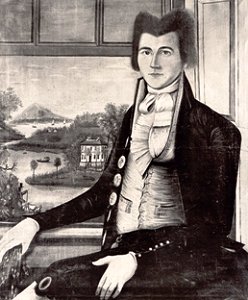Introduction
Born: July 23, 1758, Worcester, Massachusetts.
Died: July 23, 1842, Suffield, Connecticut (died on his birthday).
Buried: Center Cemetery, Northfield, Massachusetts.

Born: July 23, 1758, Worcester, Massachusetts.
Died: July 23, 1842, Suffield, Connecticut (died on his birthday).
Buried: Center Cemetery, Northfield, Massachusetts.

Swan was of Scottish descent, the son of goldsmith William Swan and Lavinia Keyes, and husband of Mary Gay, daughter of Ebenezer Gay, third minister of the First Congregational Church of Suffield (married 1784). Several of his ten children with Mary were musicians like their father.
One of the early American psalmodists, little is known of Swan’s early years. He lived in Worcester until his father’s death in 1774.
He later moved to Groton, Massachusetts, to live with his older brother, William, whose active interest in music may have influenced him.
Shortly after arriving in Groton, Swan enrolled in a singing school taught by a Mr. Gross. This experience was probably the only formal musical training Swan ever had.
In 1774, Swan left Groton to enlist in the Continental Army in Cambridge, Massachusetts. It was here he learned to play fife under the tutelage of a British fifer.
In 1775, a little less than a year after enlisting, Swan moved to Northfield, Massachusetts. There he became apprenticed as a hatter with his brother-in-law, Caleb Lyman.
In Northfield, Swan’s attention became focused on musical composition. His first tune, Montague, can be placed around 1774 when Swan was 16 years old.
After completing his apprenticeship in 1780, Swan moved to Entfield, Connecticut, then to Suffield, Connecticut, in 1782. It was in Suffield that Swan composed most of his music.
Supplementing his work as a hatter, Swan began teaching singing schools in the area. It was during this time his music was first printed. In 1783 composer-compiler Oliver Brownson included six of Swan’s tunes in the third issue of Select Harmony.
This was followed by requests from other compilers and publishers to include Swan’s tunes in their tune books and other publications.
By 1800, his tunes were being printed in New York, Virginia, New Hampshire, Pennsylvania, Maryland, Massachusetts, and Connecticut. This rise in interest in his music prompted Swan to publish his music himself. Collaborating with Alexander Ely, Swan published The Songster’s Assistant around 1786. The book was a Collection of secular duets, to which Swan contributed half of the songs.
In 1801, Swan published the New England Harmony. Unlike The Songster’s Assistant, it was a Collection of sacred works, with over 104 pages of original music. The Collection contained many tunes that had been previously printed, including his first tune, Montague. However, the book was not well received, and Swan did not publish another Collection after 1801.
Even though his book did not do well, Swan’s music was still in demand, and was published later by other compilers. After publishing the New England Harmony, Swan moved to Vermont, then to Northfield, Massachusetts.
In October 1807, 25 years after settling in Suffield, Swan and his family moved back to the town of his childhood, possibly due to his mother’s failing health. She died six years later in 1813. Upon returning to Northfield, Swan went into the millinery business with his nephew, Josiah Dwight Lyman.
Swan continued to compose music and receive requests from compilers seeking to purchase rights to some of his more popular tunes.